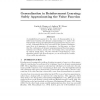141 search results - page 5 / 29 » Fuzzy Kanerva-based function approximation for reinforcement... |
IWANN
1999
Springer
13 years 12 months ago
1999
Springer
To avoid the curse of dimensionality, function approximators are used in reinforcement learning to learn value functions for individual states. In order to make better use of comp...
ATAL
2007
Springer
14 years 1 months ago
2007
Springer
Reinforcement learning promises a generic method for adapting agents to arbitrary tasks in arbitrary stochastic environments, but applying it to new real-world problems remains di...
NIPS
1994
13 years 9 months ago
1994
To appear in: G. Tesauro, D. S. Touretzky and T. K. Leen, eds., Advances in Neural Information Processing Systems 7, MIT Press, Cambridge MA, 1995. A straightforward approach to t...
ICML
2004
IEEE
14 years 8 months ago
2004
IEEE
Synchronous reinforcement learning (RL) algorithms with linear function approximation are representable as inhomogeneous matrix iterations of a special form (Schoknecht & Merk...
AAAI
2011
12 years 7 months ago
2011
We describe the Fourier Basis, a linear value function approximation scheme based on the Fourier Series. We empirically evaluate its properties, and demonstrate that it performs w...

